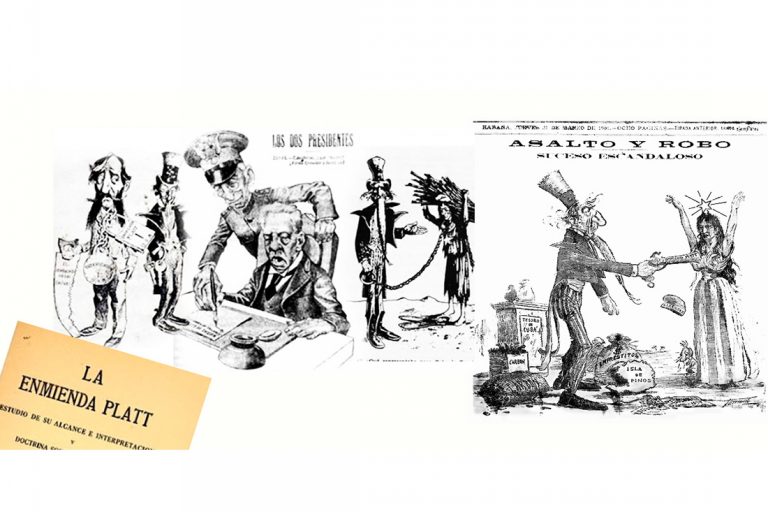By: Carlos Pedro Amengor Ministrar
The intellectual Eduardo Torres-Cuevas emphasizes that: By forcing Cuba to accept it, [Platt Amendment] is not an amendment to the constitutional text, but rather an addendum to it… The opposition to the constitutional addendum imposed by Washington reached dramatic overtones… ”
In the historical context of the closing of the 19th century and the dawn of the new century, Cuba, as a consequence of the intervention of the United States in the war between Cuba and Spain through the Treaty of Paris, passed from the hands of the Spanish metropolis to those of the imperialism of the United States of America.
On January 1st, 1899, the first North American intervention in Cuba began and on March 24th, Major General Lope Recio Loynaz took office as Civil Governor of the province of Puerto Príncipe, who replaced the North American General Louis. H. Carpenter.
Subsequently, Brigadier General Armando Sánchez Agramonte was appointed Municipal Mayor of the province by the intervening authorities.
1900
On June 16th, 1900, the first municipal elections were held in Cuba after the cessation of Spanish sovereignty to elect mayors and other municipal authorities.
The government of the United States, faced with the impossibility of using the annexation due to the evident rejection of the Cuban people, was forced to use other means to achieve its purpose among themselves. An independent Republic only in appearance. To draft the necessary Constitution, a Constituent Assembly was organized that began its work in November 1900, for which the following were elected as delegates by Camagüey: Salvador Cisneros Betancourt and Manuel Silva Zayas.
In the Convention’s opening speech, Leonardo Wood, Cuba’s military governor, told the audience that his duty after drafting the Constitution would be “to formulate what, in your opinion, should be the relations between Cuba and the United States.”
1901
On February 21st, 1901, with the chords of the Bayamo Anthem, the Constitution of the Republic of Cuba was signed by all the delegates. In an act of legitimate sovereignty, the constituents did not analyze the issue of relations between Cuba and the United States. However, in the Congress of this country, the debates on the Platt Amendment entered the final clarifications.
This document was brought to the attention of the Constituent Convention on March 7 through a communication from Wood to Domingo Méndez Capote in which it was specified that future relations between Cuba and the United States should be defined as part of it, or in an ordinance added to it. Efforts made by Assemblymen to modify the terms of the Platt Amendment were as numerous as they were unsuccessful; neocolonial politics was already underway.
Resistance of the people of Camagüey
On March 10th, 1901, in the Casino Campestre of the city, the people of Camagüey met and left in a demonstration towards the Civil Government building with the objective of delivering to the Governor a letter for the President of the United States in which they demanded the independence of Cuba and the cessation of North American intervention. General Maximiliano Ramos, who led the march, expressed: “The American government without any right wants to take away from us what in fact and in law corresponds to us, absolute independence.”
Institute of Secondary Education
A similar attitude was taken by the faculty and students of the Institute of Secondary Education as well as various local institutions.
On June 12th of the same year, the Platt Amendment was approved, a law of the United States Congress, imposed as an appendix to the Cuban constitution. It established that if the island’s government did not accept it, its territory would remain militarily occupied.
Among those who voted against were José Ramón Silva Zayas from Camagüey and Salvador Cisneros Betancourt who later spoke out in his “Particular vote against the Platt Amendment.”
On August 12th, 1901, the Puerto Príncipe City Council declared as Adoptive Sons of the City all the delegates from the other provinces who voted against the Platt Amendment, they were: José Lacre Morlot, Luis Fortún, Juan Gualberto Gómez, Rafael Portuondo, Eudaldo Tamayo, José B. Aleman, Rafael Manduley, Alfredo Zayas and José Fernández de Castro. Session chaired by Mayor Pedro Mendoza Guerra and unanimously approved the motion.
The principeño people, representing all Cubans, became a Historical Memory against the Platt Amendment on March 10th, 1901, starring in fact and in law in a legitimate civil act of full national sovereignty against the neocolonization of the United States.
References:
– Torres-Cuevas, E. (2007). Historia del pensamiento cubano. Volumen I, Tomo I. La Habana: Editorial de Ciencias Sociales.
Translated by: Aileen Álvarez García






